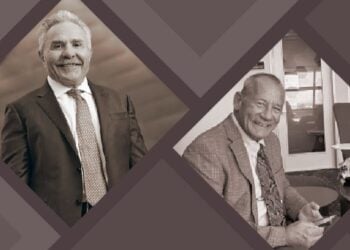Nichad Davis’ path to becoming a civil rights lawyer began at a lunch counter in Greensboro 32 years before he was born. In 1959, at what was then the Agricultural and Technical College of North Carolina, several students seeking to change Jim Crow policies in the South sought advice from Estell Harper, a former athletic standout at the school who would go on to become a professor, hall-of-fame basketball coach, and grandfather to Nichad Davis.
“My grandfather had a passion for justice, equity and equality,” said Davis. “He encouraged the students to protest, but to do it peacefully.” On February 1, 1960, the Greensboro Sit-Ins at the F.W. Woolworth lunch counter became a seminal moment in the American civil rights movement and a story Davis would hear throughout his childhood.
“Watching my grandfather be a leader in the civil rights movement was by far the greatest, most influential factor in me becoming an attorney,” said Davis, a civil rights attorney at the Law Offices of James Scott Farrin.
Davis studied psychology and African culture and history at UNC-Charlotte. He spent a year abroad at Stellenbosch University in South Africa, where he immersed himself in studying sustainable changes in food, education and legal rights in some of the country’s poorest townships. “I experienced South Africa dealing with the social and economic consequences of apartheid, just like my grandfather experienced the South coping with racial segregation 50 years earlier.”
Four years of teaching middle school social studies helped Davis focus on the importance of civil rights, education law and equal access to education. But the stories from his childhood stayed with him.
“I decided being a lawyer was the best pathway for me to be a community leader, fight for justice, and shape the opportunities people have, just like my grandfather did.”
The Fourth Amendment
Davis said many people affected by the Fourth Amendment do not understand the full impact it has on the use of force, search and seizures, and most police interactions.
“Over the last 100 years, from the U.S. Supreme Court on down to state courts, we haven’t done a good job of protecting the humanity of American citizens. Now, you add the element of systemic racism, and it creates this culture of violence. I don’t think we’ve gotten better since the ’90s,” said Davis.
He wants to change that. Most of his civil rights clients have been victims of alleged police misconduct, police brutality or malicious prosecution. His work guides them through what is likely the most traumatic experience of their lives while helping them fight for justice in the court system.
“If there’s one thing I want to do, it’s to help change our culture of policing. Fourth Amendment jurisprudence directly impacts 21st-century policing, and that’s why the bulk of our cases focus on those constitutional rights.”
An Indelible Impact
At 33, Davis is building a practice he hopes will fulfill a promise he made to his grandfather’s memory, and to himself, to become North Carolina’s next great civil rights lawyer.
When he goes home to his wife, Deandra, and their children, Nova, 3, and Nichad II, 2, Davis says he reflects on the stories he heard growing up and how they changed not only his life, but those of his children as well.
“My dream is to leave an indelible impact and legacy to my children that inspires each of them to be architects of a better world, to lead with compassion, and to stay proximate to the humanity of every person they encounter.”








